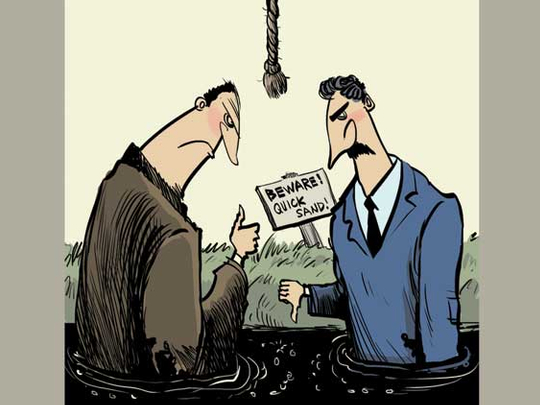
Mohammad Chatah was murdered because he stood up for Lebanon, a somewhat dysfunctional country whose population — at least a substantial majority — worked in earnest to preserve its freedoms and ensure prosperity. Regrettably, a significant minority was no longer anxious to safeguard existing liberties, as it refused the primacy of the Constitution. Rather, Hezbollah — and not the entire Shiite community — pledged to implement the vilayet-e faqih [Jurisconsult of God], under direct Iranian authority. Under the circumstances, what were Lebanon’s chances to survive as a nation-state and, in the negative, when will it inevitably break-apart?
The question was not merely an intellectual exercise to test the hypothesis as to whether Lebanon was a failed state. Instead, and in the face of an unprecedented constitutional vacuum — challenged parliamentarians who cavalierly extended their term in office and continued to neglect their duties, no government after a nine-month long gestation period and no consensus on a new head of state to replace Michel Sulaiman in May 2014 — one simply wondered what would the consequences of such hollowness be.
At this juncture, it was critical to ask what were Hezbollah’s demands? Created by the Iranian Revolutionary Guards in 1985, Hezbollah earned support as it resisted Israeli occupation and though its operatives were responsible for anti-western attacks — especially the 1983 suicide bombings of the American and French Multinational Peacekeeping Forces that killed 241 US marines, 58 French paratroopers and six civilians — the militia was permitted to keep its weapons in 1990 under strong Syrian tutelage. The party reached its zenith in July 2006, when it resisted a massive Israeli assault on its South Lebanon strongholds for 34 days, when many admired its resilience.
A “divine victory” was recorded even if nothing of the sort occurred and while an estimated 1,300 Lebanese citizens and 165 Israelis were killed. In the event, Hezbollah could not translate its courageous defiance into effective political gains and it was not long before Hezbollah turned its guns on fellow Lebanese in May 2008 that placed it on its ongoing obstructionist course. Today, party leaders articulate that the “national movement of resistance” must continue its goal to liberate Occupied Territories though, in reality, what Hezbollah wants is to be the ultimate decision-maker in Lebanon. Simply stated, and although the party entered into alliances and considered political coalitions to be in the interests of the country, Hezbollah was not willing to share power according to the existing national charter, the constitution, or the Ta’if Accords that ended the 1975-1990 civil war.
To be sure, Hezbollah shed blood for Lebanon, though it was equally true that accusations that it carried out most of the assassinations in Lebanon were flawless. Open threats were part and parcel of what passed for political discourse in this country, with Hezbollah’s secretary-general, Hassan Nasrallah, or its leading members of parliament — men like Mohammad Ra‘ad and Nawwaf Moussawi — proposing to cut the hands of those who dared question what the party was doing. No one was spared, including the president of the republic, who was openly warned not to agree to a de facto government that would be a “threat to Lebanon”. What was on the cards was dialogue, but on its own terms, which meant that Hezbollah would only accept a government that would give it a blocking third of all portfolios or it might opt for another May 7 scenario.
Less than three months from now, Lebanon will face an unprecedented challenge to elect a new president, though chances are excellent that parliament, which is constitutionally mandated to select the incumbent, will fail to agree on a successor to Michel Sulaiman. Under the circumstances, if Sulaiman’s term is not extended, Beirut will be plunged in yet another dark period, especially if prime minister designate, Tammam Salam, is not allowed to form his government beforehand.
Importantly, and in the aftermath of the latest assassination, demands that a government be formed without Hezbollah ministers may not sit well, even if the party’s participation in Syria’s war has stripped it of its legitimacy. Equally problematic is the generous $3 billion (Dh11 billion) financial support extended by the Kingdom of Saudi Arabia to the Lebanese Armed Forces (LAF) to strengthen its innate capabilities. Riyadh’s grant — not loan — was a clear message to Hezbollah and Iran, as Saudi King Abdullah Bin Abdul Aziz stood by the state not merely with his words, but with concrete backing. Saudi Arabia persuaded France to transfer effective weapons to the LAF precisely to prove that the army could indeed protect the country. Time will tell whether Paris will actually sell real armaments that will create the wherewithal to transform the LAF into a capable defensive force. Time will also determine whether the international community, led by Saudi Arabia, will succeed in preserving Lebanon’s sovereignty.
The new year is epochal for Lebanon. Whether the country will survive is the ultimate question though the odds are stacked against it. If legitimate institutions are preserved, then it is safe to anticipate relative peace and prosperity. If, on the other hand, Beirut plunges into a political void, renewed civil war or long-term instability cannot be eliminated as real outcomes. Moreover, and while a new national compact may be inevitable, it is unrealistic to assume that one can be devised in the absence of a consensus over the country’s identity.
Short of that, 2014 may be the year when a fresh chapter of the Arab Spring will begin to divide Beirut between those who aspire for more freedom and those who crave to submit to foreign authority. For 70 years, the Lebanese agreed to disagree and kept their country’s legitimate institutions weak, which led to the current polarisation. The next seven months will demonstrate whether they will remain unified or, alternatively, begin the partition process.
Dr Joseph A. Kechichian is the author of the recently published Legal and Political Reforms in Saudi Arabia (London: Routledge, 2013).










